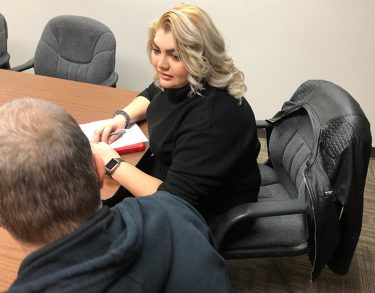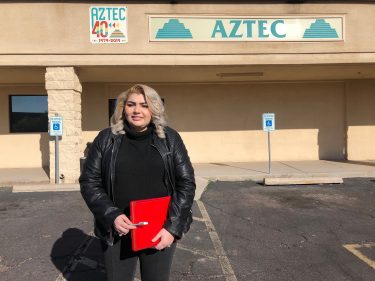
By Mike Kilen
GCU News Bureau
Julia Gonzales quietly listened to the woman with mental and intellectual disabilities.
I want to spend my $10 at the Dollar Store, she said.
I want to eat chocolate cupcakes for my birthday.
I don’t want a guardian.
“Is there a reason why?” Gonzales asked her.
“Yes, because my mother passed away, and I am a lady now. I can take care of my responsibilities.”
The woman is one of 9,300 wards of the county, vulnerable adults with mental, physical or intellectual disabilities whom the Superior Court of Maricopa County has deemed incapacitated to make responsible decisions and are assigned a guardian to help make them.
Gonzales is a Grand Canyon University student who is a court visitor -- another set of eyes and ears for the woman, observing her care while also checking on the guardian the court has assigned to her.
“The students really have a heart for helping people. These are amazing students,” said PJ Fair, Guardianship Review Coordinator for the Guardian Review Program, which began partnering with GCU and 10 students in 2019 and continues to grow.
The nationally recognized program has trained volunteers to conduct in-person visits in an effort to reduce the potential for neglect and abuse of vulnerable wards.

Gonzales scratched down notes, describing the woman as “alert, responsive, pretty independent and appropriately dressed.” She asked the staff of the Arizona Training and Evaluation Center in Peoria if the woman was taken out for activities, got exercise and ate properly.
“We want to see that they are taken care of,” said Gonzales, a senior psychology major who will graduate in April. “What we are looking for is signs of abuse.”
Sometimes, she said, it is difficult to communicate with the wards with mental or intellectual problems, so she must adjust her approach to her questions. Other times, they don’t trust people who are with the court, so she presents herself as a friendly visitor.
“It just reminded me of when I was little, helping people,” Gonzales, a Phoenix native who has conducted reports on 32 cases in the past year, all while taking classes and helping run a nonprofit with her parents that aids ministries in North and South America.
“When I was younger, I helped veterans and went to poverty-stricken communities and passed out food,” she said. “I learned to look at someone else’s life instead of just thinking about yourself.”
Here at the day center in Peoria and in other care facilities across the county, she gets to see people face-to-face and help them.
On one trip to a care facility, an older woman told her that they took away a lift chair that helped her stand. Gonzales filed a report. The lift was returned.
“I felt like I did something to help that woman’s day,” she said.
Kevin Walling, Chair of Justice Studies, Government and History in the College of Humanities and Social Sciences, contacted the Guardian Review Program to partner with students, a perfect match for those in justice and psychology studies.
“GCU students want to have a meaningful experience. They want to do work that counts,” he said. “The guardianship program offers them that opportunity by working with vulnerable members of the community; students lend them support and help voice for their needs. This is valuable and makes real differences in people’s lives.”
Fair has joined the students to train them in every place from a calm day facility to a locked psych ward at a state hospital and witnessed a combination of toughness and tenderness.

“One time when I took students to a locked wing, it was like ‘fly, little bird.’ But then we were outside the doors watching and seeing them with their clipboards and heads held high – that was something,” she said.
Other times, she has seen the student literally get on the floor to play blocks and interact with people who have challenges.
“They acknowledge the level that person is and meet them at that level,” Fair said. “Seeing that from such young kids -- there is definitely hope for the future.”
The students who hope to one day have justice careers get an opportunity to see medical and court files and file reports that become part of official court records.
Katelyn Siltman, who graduated in December and will be working toward a master’s at GCU, wants a career in forensic psychology. The program has given her a chance to be exposed to the population she wants to assist.
Why this work?
“Mainly because growing up I was a difficult child to work with myself, and without the social worker who helped me I’d never have got to college to study psychology. I want to have the opportunity to give that to someone else,” she said.
It’s been an eye-opener for other students.
Junior Denny Li joined Fair at a house thick with cigarette smoke where transients, gang members and drugs were visible.
“You would never know these conditions exist unless you went out and talked to them,” he said.
They filed a report that would go before a judge to decide if there needed to be further investigation or changes to the guardian arrangement.
“I feel like mental illness is a big problem that requires a lot of attention,” he said. “It is sad being in a group home or hospital and they can’t take care of themselves and people don’t take care of them.”
Fair said it helps students to see if they can handle the unusual situations out in the field.
“In the beginning, all you have is people on a piece of paper with diagnosis. Then you get to go out and meet them,” she said. “You get to see their personality and character. You get out there and they have more personality than someone who is stone-cold ‘normal.’ They are giving you high fives or just blinking at you. Just the energy of not being down on their diagnosis is rewarding.”
That’s what drives Gonzales. Later that day at Aztec, she did two other interviews with wards who couldn’t communicate. But she talked to them gently and asked the staff questions.
“It’s been a big culture shock to me. People need help,” she said. “In that one case of the lift, I felt like I made a different in that person’s life. I made a difference, and it felt pretty good.”
Grand Canyon University senior writer Mike Kilen can be reached at [email protected] or at 602-639-6764.



































































